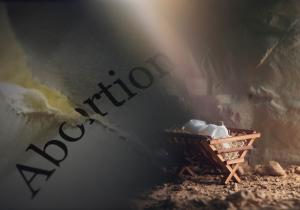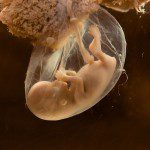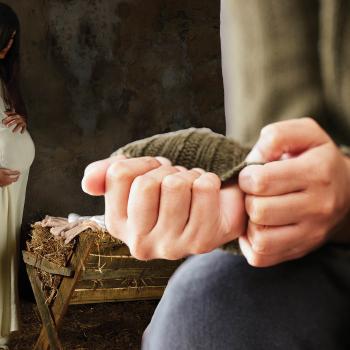
In my last post, I posed the question, “How does support for abortion fulfill the Great Commandment and the Great Commission?” which is the first of four key questions to address to determine if the pro-choice position is consistent with the life and teachings of Jesus. However, a Christian who professes to be pro-choice might respond to the argument – that abortion violates the Great Commandment and the Great Commission – by saying, “I agree that Christians are supposed to have compassion and mercy on the baby in the womb. But what if I don’t believe it’s a baby? What if I don’t believe it’s a person yet?”
So a key second question a pro-choice Christian must consider is “When did Jesus’s human life begin?” Accordingly, it is critical to inspect what Scripture says about “personhood.” Does the Bible have a perspective on when the “contents” of an expecting mother’s womb become a baby? The answer is critical because our entire Christian faith and salvation depend upon it. Jesus was a perfect substitute for us. Was Jesus in fact both fully God and fully human? Jesus’s humanity has to match our humanity in every respect or else he’s not a perfect substitute for us and we are lost.
Many parts of Scripture address this, but looking at the life of Jesus himself—and his experience of being like us—can make for a more compelling case for us as Christians than isolated verses. Several passages in Scripture address this principle. Hebrews 2:17 says, “Therefore he had to be made like his brothers in every respect, so that he might become a merciful and faithful high priest in the service of God, to make propitiation for the sins of the people.” 1 Peter 2:24 says, “He himself [Jesus] bore our sins in his body on the tree.” Colossians 2:9 says, “For in him, the whole fullness of deity dwells bodily and you have been filled in him who is the head of all rule and authority.”
So, if Scripture establishes Jesus as fully God and fully man, then the question becomes, “When did Jesus’ humanity begin?” Isaiah 7:14 says, “Behold a virgin shall conceive and bear a son…” Here, the Bible addressed both conception and birth. Even though the mechanics of Jesus’ conception were different, the reality of his conception and birth were the same as ours— “made like his brothers in every respect.” A helpful analogy is artificial insemination; for a child who comes into the world via artificial insemination, the initial mechanics are different than the way children typically come into the world, but the practical reality of their conception and birth are the same. From conception on, there is no difference.
This is exactly what you see in the birth of Christ, and that is why it is critically important to establish Biblically that Jesus’ life began at conception. Because if Jesus’ human life began at conception, then ours had to begin at conception as well. If not, then Jesus cannot be the perfect substitute for us and take on our sin, and our entire faith crumbles.
So, if a Christian who professes to be pro-choice argues that you’re not actually a person in the earliest stages of pregnancy—you’re not actually a life—then Jesus was not a life at this stage in his humanity either. If one were to believe this, then one must also believe there was a point at which Jesus in his incarnation, God himself, was not alive. This idea, of course, is inconsistent with the very definition of God, who can never not “be.” “I Am that I Am,” means that God always is. He has always been that way, and He will always be that way.
I heard a pro-choice Christian once argue that the baby in the womb is not a life, but is a “potential life.” I understand why a person would try to make that argument. When trying to support an abortion decision, this reasoning sounds better than, “It’s a life, but a life worth sacrificing.” The problem with the concept of “potential life” is that anything that has potential can be something else. A coach can say of a football player who joins his team, “That guy’s got a lot of potential,” but the player can turn out to be a bust. Potential is not always reality. If it is potentially something, then it potentially can be something else. But Jesus could not be a potential life in the womb. Why? Because He cannot and could not be anything else other than what He is—fully God and fully man, alive in Mary’s womb from the moment of conception.
Potential also brings with it the concept of uncertainty. When you say of the football player, “He’s got potential,” uncertainty is built into that statement. But being God means there is no uncertainty on the matter. God always operates in certainty.
This line of thinking—that there is a period of time after conception that an unborn baby is not yet a life—can lead to another dangerous fallacy: the belief that life is “constructed” in the womb. Babies are not constructed in the womb like a Tesla on an assembly line. When is a Tesla truly a Tesla? When the wheels are put on? When they put on the nameplate? I submit that a Tesla is never intrinsically a Tesla. Why? Because at any point you can turn a Tesla into a toaster. It always has the potential to be something else.
But babies are not constructed; they develop. That’s why there are classes on human development, not human construction. Once conceived, a baby cannot be anything else. Much like a Polaroid picture, once you take it, it can only be what the lens saw. When you first look at an undeveloped Polaroid, it looks like a black square. But “in the fullness of time,” it develops into what the lens captured, and only that. You can’t take a picture of an apple and have it develop into a picture of an orange. It is intrinsically what it is and can’t be anything else – just like Christ in Mary’s womb and just like any baby in a mother’s womb. There is no uncertainty, from the moment of conception.













